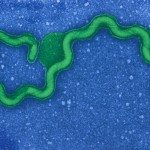Lien vers Pubmed [PMID] – 25474719
Lien DOI – 10.1371/journal.pntd.0003359
PLoS Negl Trop Dis 2014 Dec; 8(12): e3359
Leptospira (L.) interrogans are bacteria responsible for a worldwide reemerging zoonosis. Some animals asymptomatically carry L. interrogans in their kidneys and excrete bacteria in their urine, which contaminates the environment. Humans are infected through skin contact with leptospires and develop mild to severe leptospirosis. Previous attempts to construct fluorescent or bioluminescent leptospires, which would permit in vivo visualization and investigation of host defense mechanisms during infection, have been unsuccessful. Using a firefly luciferase cassette and random transposition tools, we constructed bioluminescent chromosomal transformants in saprophytic and pathogenic leptospires. The kinetics of leptospiral dissemination in mice, after intraperitoneal inoculation with a pathogenic transformant, was tracked by bioluminescence using live imaging. For infective doses of 106 to 107 bacteria, we observed dissemination and exponential growth of leptospires in the blood, followed by apparent clearance of bacteria. However, with 2×108 bacteria, the septicemia led to the death of mice within 3 days post-infection. In surviving mice, one week after infection, pathogenic leptospires reemerged only in the kidneys, where they multiplied and reached a steady state, leading to a sustained chronic renal infection. These experiments reveal that a fraction of the leptospiral population escapes the potent blood defense, and colonizes a defined number of niches in the kidneys, proportional to the infective dose. Antibiotic treatments failed to eradicate leptospires that colonized the kidneys, although they were effective against L. interrogans if administered before or early after infection. To conclude, mice infected with bioluminescent L. interrogans proved to be a novel model to study both acute and chronic leptospirosis, and revealed that, in the kidneys, leptospires are protected from antibiotics. These bioluminescent leptospires represent a powerful new tool to challenge mice treated with drugs or vaccines, and test the survival, dissemination, and transmission of leptospires between environment and hosts.



